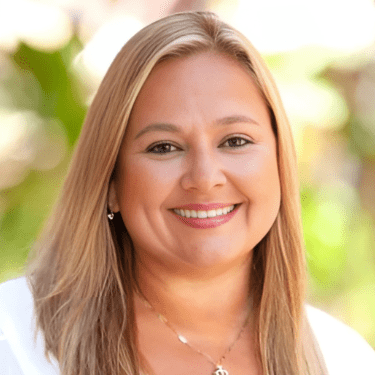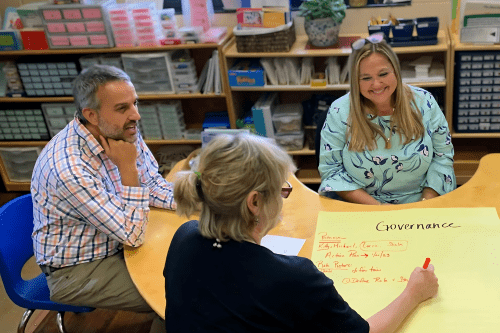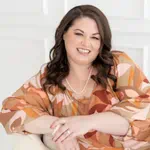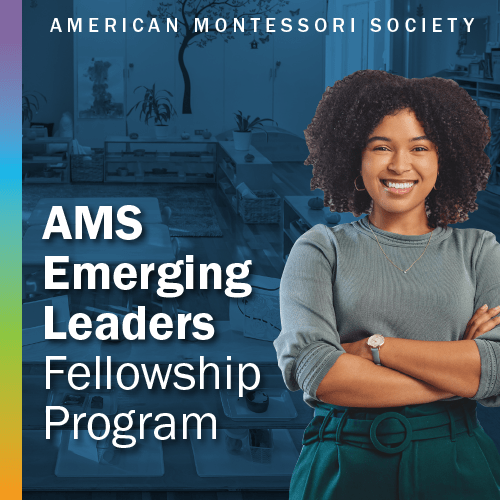 Lorna Cohen, a recent graduate of the AMS Emerging Leaders Fellowship Program, is the co-founder of Florida Montessori Partnerships (FMP), an organization that “works to support the Montessori community across the state of Florida through advocacy, research, and collaboration.” Lorna grew up in Puerto Rico in a large family who deeply valued service and education. Lorna holds AMS Early Childhood and Elementary credentials along with several state certifications. She works as the Associate Director of Montessori Curriculum and Instruction at Countryside Montessori Charter School (CMCS) in Land O’ Lakes, FL. In this digital interview, Lorna shares her story, revealing how her experience as an AMS Emerging Leaders Fellow impacted her professional journey.
Lorna Cohen, a recent graduate of the AMS Emerging Leaders Fellowship Program, is the co-founder of Florida Montessori Partnerships (FMP), an organization that “works to support the Montessori community across the state of Florida through advocacy, research, and collaboration.” Lorna grew up in Puerto Rico in a large family who deeply valued service and education. Lorna holds AMS Early Childhood and Elementary credentials along with several state certifications. She works as the Associate Director of Montessori Curriculum and Instruction at Countryside Montessori Charter School (CMCS) in Land O’ Lakes, FL. In this digital interview, Lorna shares her story, revealing how her experience as an AMS Emerging Leaders Fellow impacted her professional journey.
What was the most valuable aspect of your experience in the Emerging Leaders Fellowship Program?
Lorna: The Emerging Leaders Fellowship was an incredible opportunity and a gift of collaboration, leadership, personal and professional growth, and a key element to making contact with great leaders in the Montessori community. The most valuable aspect, for me, was the ability to surround myself with people who have the same desires and concerns that I have, and who want to be a part of change. The opportunity to work with Montessorians like Gay Ward and Michelle Hartye who bring out knowledge in you that you didn’t even know you possessed. The bond that is created with other members and leaders of the cohort is also so special. Throughout the 30 years I have spent in Montessori and as an AMS member, this by far was the most enlightening experience of my professional career!
How did your experience in the Fellowship impact your career?
Lorna: The Emerging Leaders Fellowship has been everything for my career! It strengthened my beliefs and my core values. It helped me to grow from teacher to coordinator to associate director at CMCS and also reassured me that I was ready for other challenges such as pursuing my Montessori leadership credential. This experience also gave me the courage needed to create the state organization that I dreamed of, working for the advocacy of Montessori.
What skills and knowledge did you gain during the Fellowship that helped you advance in your professional journey?
Lorna: Confidence, but at the same time, humility to understand how to work with others, how we are all a community, and how the work speaks for itself. It also strengthened my ability to seek information and learn how to say, “I don’t know,” “I am not sure,” or “I need help to comprehend” when I encounter roadblocks. It made me realize that the fear of moving forward and trying new things is actually the leadership vein we all possess.
The vulnerability that we experience when we begin a new journey as a leader is one we all share. Being in the program, surrounded by established Montessori leaders, helped me realize that we all feel the same fears and share the same desire to serve and advocate. It was the fellowship that helped me move past my fears, seeking the information I needed to help make things happen!
Learn more and apply today.
Where did the inspiration for your capstone project originate from?
Lorna: The inspiration for the capstone project originated from a desire to strengthen Montessori in the state of Florida, from the hope Montessori education holds for our children, and from the desire to serve as a positive link, unifying Montessori philosophy and pedagogy for children in our state.
Share with me the process for creating FMP as a capstone project.
Lorna: As I began the research for my capstone project, I discovered a lack of procedural policies for the formation of Montessori state organizations. Little information was available about the process for creating a statewide organization to serve the vast and diverse Montessori community that already existed. I realized early on that tenacity and hard work would be the only way I was going to get somewhere.
I found the best resources to be the personal experiences of leaders from other states who have created their own statewide organizations and I began interviewing these Montessori leaders. My initial contact with AMS executive director, Munir Shivji, gave me a push in the right direction; one connection led to another, and then another, and then another, and little by little, I was getting the answers I needed to make my dream a reality.
I met with the founders of the Montessori Alliance of Florida, a former state-wide organization, Kathy Leitch and Sheila Linville, to whom I proposed the creation of a new state organization. We discussed the purpose for creating the organization and why their initial alliance faced challenges with growth. The information they shared was crucial in ensuring I didn’t repeat those same mistakes. I shared my ideas and goals with Kathy and Sheila and invited them to join me in my quest. Sheila jumped on board and partnered with me, alongside Michael Picone, head of school at CMCS, and the three of us became the official founders of FMP.
It was now time to complete the SWOT process, a system of research recommended by the Emerging Leaders mentors to help carefully analyze the strengths, weaknesses, opportunities, and threats of the organization. Here’s what we came up with:
- Strengths: connections to a large group of strong state leaders and education centers who are willing to guide and support us
- Weaknesses: the large size of our state, the lack of procedural policies for establishing state-wide Montessori organizations
- Opportunities: support from local school leaders, financial funding for website development, the ability to gain representation for our organization through the Montessori Public Policy Initiative (MPPI), schools willing to host meetings, the ability to provide forums for all Montessori teachers in Florida, ability to work towards state certification for Montessori educators equal to that provided by the Florida Department of Education
- Threats: the lack of participation from Florida leaders in previously developed state organizations, resistance to travel (especially since Florida is such a large state)
Strategic planning was initiated after Sheila, Michael, and I met several times and determined the goals of the organizations. Sheila’s organization, the Andrews Educational Institute, offered generous financial support for my capstone project and the organization. We began partnering with many others who helped us to design our logo and build our website.
In September 2022, I attended the Montessori Public Policy Initiative (MPPI) Advocacy Conference where I worked alongside Kathy Leitch, the executive director of the International Montessori Council (IMC), Vyju Kadambi, state advocacy associate of MPPI, and Denise Monnier, director of state advocacy of MPPI, and many others, ensuring the initiative for Florida could begin immediately. Our organization became the contact for the state of Florida on the MPPI website just a few months after that.
We then began seeking out seasoned and new Montessorians within the state to join FMP. We reached out to schools in the area via email, sharing about the creation of our organization. We also contacted Kitty Bravo, director of education for the Center for Guided Montessori Studies (CGMS), who helped us publish an article about my capstone project and FMP on The Montessori Post.
Tell me about some of the projects FMP has worked on or is currently working on.
Lorna: FMP is currently working on spreading its mission and vision to Montessori constituents across the state of Florida. Our first meeting was held on October 15, 2022 at CMCS. We had a quorum of 25 attendees including teachers, parents, a board member, and representatives from educational Montessori centers. At the meeting, we created our four committees (membership, education, advocacy, and governance), drafted a mission and vision, discussed the organization’s goals, welcomed Vyju from MPPI to explain how we would partner together and the importance of advocacy work, and connected with faculty from CGMS and IMC.
Since then, we’ve hosted another in-person meeting at Innovation Montessori School in Ocoee, Florida where we revised the mission and vision for final determination, connected with members in the central region of the state, and connected with representatives from the Maitland Montessori Teacher Training Program and the Orlando Montessori Teacher Education Institute and a virtual meeting with the Montessori community in the panhandle. We also gathered together at the International Montessori Council’s Annual Conference in St. Petersburg, Florida and at the AMS Montessori Event in Boston where we also represented FMP at a shared vendor booth based on a gracious invitation from Marie Conti, senior director of community and events at AMS.
At the moment, we have four committees, membership, advocacy, education, and governance. These committees work to manage member registrations and our social media platforms, partner with MPPI and other groups who support us in planning the next steps for teacher accreditation for Montessori educators in Florida, and to make decisions about the future of the organization.
What are some future goals FMP hopes to accomplish?
Lorna: We will continue meeting every third Monday of the month through Zoom where we invite anyone who’s interested to join us. We are also planning a meeting in the North region of the state, close to the Jacksonville or Gainesville area. We want to reach as many people as possible.
We have compiled a list of all teaching centers accredited by the Montessori Accreditation Council for Teacher Education (MACTE) and are beginning to reach out to them to help us spread the word. We have also started a list of all of the Montessori schools in the state and are looking for members to help us in making contact with these schools. We would like to begin a validation process whereby we ensure that all Montessori schools in the state of Florida are using the same Montessori principles; we feel this is key for our advocacy work.
In the near future, we also hope to offer professional development workshops to Montessori educators.
Most importantly, we hope to gain support for Montessori educators to have their credentials recognized and approved by the state. This would be a huge win for us and for Montessorians in Florida!
What is your advice for other teachers or administrators hoping to establish a state organization?
Lorna: My advice is to reach out to Montessori leaders in your state, heads of school, directors of training programs, prior groups who have done some of the work; don’t try to reinvent the wheel. Gather constituents that are involved and are willing to work hard for the mission of the organization. Seek help from other state organizations; they are always willing to share what has or has not worked for them. As Maria said herself, “Every great cause is born from repeated failures and from imperfect achievements.” I want other teachers and administrators hoping to establish state organizations to know that we will all make mistakes, but it is important that we continue this important work.



